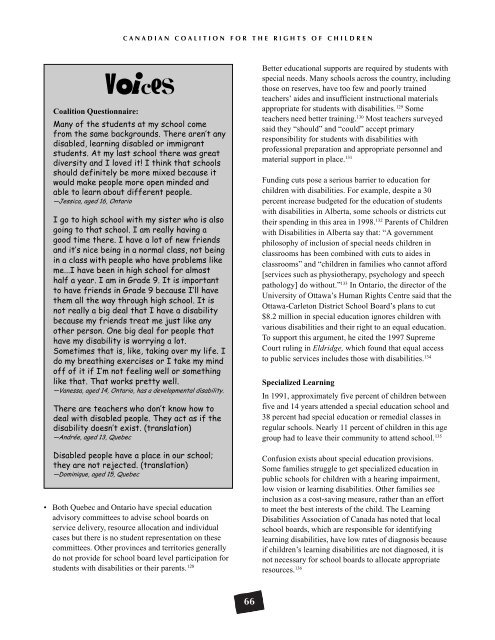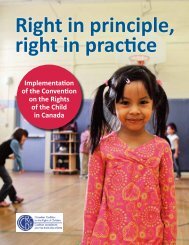Poste - Canadian Coalition for the Rights of Children
Poste - Canadian Coalition for the Rights of Children
Poste - Canadian Coalition for the Rights of Children
You also want an ePaper? Increase the reach of your titles
YUMPU automatically turns print PDFs into web optimized ePapers that Google loves.
<strong>Coalition</strong> Questionnaire:<br />
C A N A D I A N C O A L I T I O N F O R T H E R I G H T S O F C H I L D R E N<br />
Voices<br />
Many <strong>of</strong> <strong>the</strong> students at my school come<br />
from <strong>the</strong> same backgrounds. There aren’t any<br />
disabled, learning disabled or immigrant<br />
students. At my last school <strong>the</strong>re was great<br />
diversity and I loved it! I think that schools<br />
should definitely be more mixed because it<br />
would make people more open minded and<br />
able to learn about different people.<br />
—Jessica, aged 16, Ontario<br />
I go to high school with my sister who is also<br />
going to that school. I am really having a<br />
good time <strong>the</strong>re. I have a lot <strong>of</strong> new friends<br />
and it’s nice being in a normal class, not being<br />
in a class with people who have problems like<br />
me...I have been in high school <strong>for</strong> almost<br />
half a year. I am in Grade 9. It is important<br />
to have friends in Grade 9 because I’ll have<br />
<strong>the</strong>m all <strong>the</strong> way through high school. It is<br />
not really a big deal that I have a disability<br />
because my friends treat me just like any<br />
o<strong>the</strong>r person. One big deal <strong>for</strong> people that<br />
have my disability is worrying a lot.<br />
Sometimes that is, like, taking over my life. I<br />
do my breathing exercises or I take my mind<br />
<strong>of</strong>f <strong>of</strong> it if I’m not feeling well or something<br />
like that. That works pretty well.<br />
—Vanessa, aged 14, Ontario, has a developmental disability.<br />
There are teachers who don’t know how to<br />
deal with disabled people. They act as if <strong>the</strong><br />
disability doesn’t exist. (translation)<br />
—Andrée, aged 13, Quebec<br />
Disabled people have a place in our school;<br />
<strong>the</strong>y are not rejected. (translation)<br />
—Dominique, aged 15, Quebec<br />
• Both Quebec and Ontario have special education<br />
advisory committees to advise school boards on<br />
service delivery, resource allocation and individual<br />
cases but <strong>the</strong>re is no student representation on <strong>the</strong>se<br />
committees. O<strong>the</strong>r provinces and territories generally<br />
do not provide <strong>for</strong> school board level participation <strong>for</strong><br />
students with disabilities or <strong>the</strong>ir parents. 128<br />
66<br />
Better educational supports are required by students with<br />
special needs. Many schools across <strong>the</strong> country, including<br />
those on reserves, have too few and poorly trained<br />
teachers’ aides and insufficient instructional materials<br />
appropriate <strong>for</strong> students with disabilities. 129 Some<br />
teachers need better training. 130 Most teachers surveyed<br />
said <strong>the</strong>y “should” and “could” accept primary<br />
responsibility <strong>for</strong> students with disabilities with<br />
pr<strong>of</strong>essional preparation and appropriate personnel and<br />
material support in place. 131<br />
Funding cuts pose a serious barrier to education <strong>for</strong><br />
children with disabilities. For example, despite a 30<br />
percent increase budgeted <strong>for</strong> <strong>the</strong> education <strong>of</strong> students<br />
with disabilities in Alberta, some schools or districts cut<br />
<strong>the</strong>ir spending in this area in 1998. 132 Parents <strong>of</strong> <strong>Children</strong><br />
with Disabilities in Alberta say that: “A government<br />
philosophy <strong>of</strong> inclusion <strong>of</strong> special needs children in<br />
classrooms has been combined with cuts to aides in<br />
classrooms” and “children in families who cannot af<strong>for</strong>d<br />
[services such as physio<strong>the</strong>rapy, psychology and speech<br />
pathology] do without.” 133 In Ontario, <strong>the</strong> director <strong>of</strong> <strong>the</strong><br />
University <strong>of</strong> Ottawa’s Human <strong>Rights</strong> Centre said that <strong>the</strong><br />
Ottawa-Carleton District School Board’s plans to cut<br />
$8.2 million in special education ignores children with<br />
various disabilities and <strong>the</strong>ir right to an equal education.<br />
To support this argument, he cited <strong>the</strong> 1997 Supreme<br />
Court ruling in Eldridge, which found that equal access<br />
to public services includes those with disabilities. 134<br />
Specialized Learning<br />
In 1991, approximately five percent <strong>of</strong> children between<br />
five and 14 years attended a special education school and<br />
38 percent had special education or remedial classes in<br />
regular schools. Nearly 11 percent <strong>of</strong> children in this age<br />
group had to leave <strong>the</strong>ir community to attend school. 135<br />
Confusion exists about special education provisions.<br />
Some families struggle to get specialized education in<br />
public schools <strong>for</strong> children with a hearing impairment,<br />
low vision or learning disabilities. O<strong>the</strong>r families see<br />
inclusion as a cost-saving measure, ra<strong>the</strong>r than an ef<strong>for</strong>t<br />
to meet <strong>the</strong> best interests <strong>of</strong> <strong>the</strong> child. The Learning<br />
Disabilities Association <strong>of</strong> Canada has noted that local<br />
school boards, which are responsible <strong>for</strong> identifying<br />
learning disabilities, have low rates <strong>of</strong> diagnosis because<br />
if children’s learning disabilities are not diagnosed, it is<br />
not necessary <strong>for</strong> school boards to allocate appropriate<br />
resources. 136




